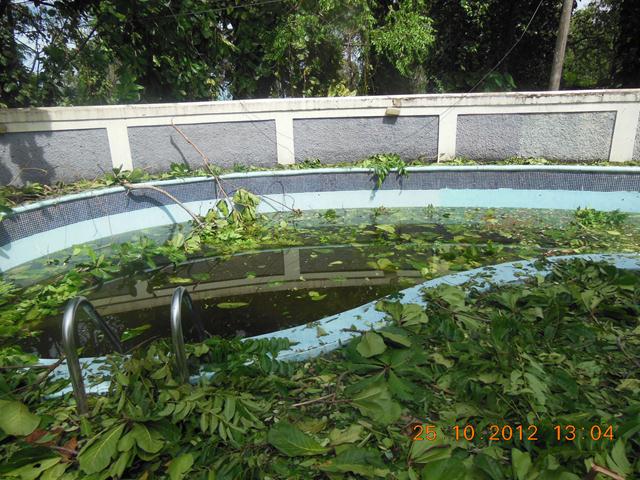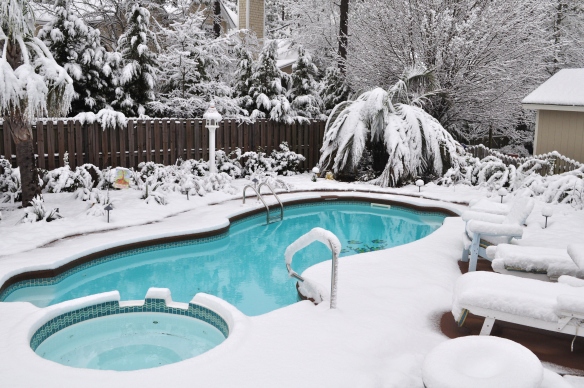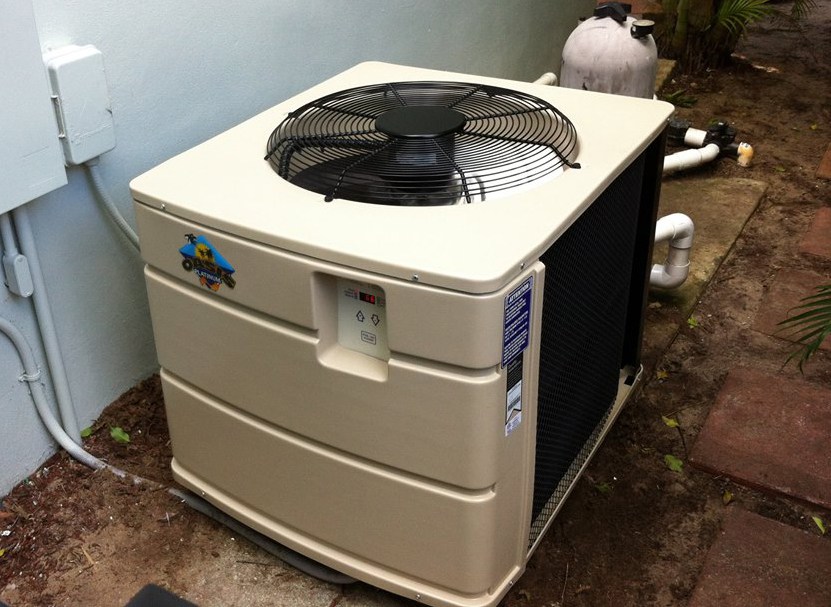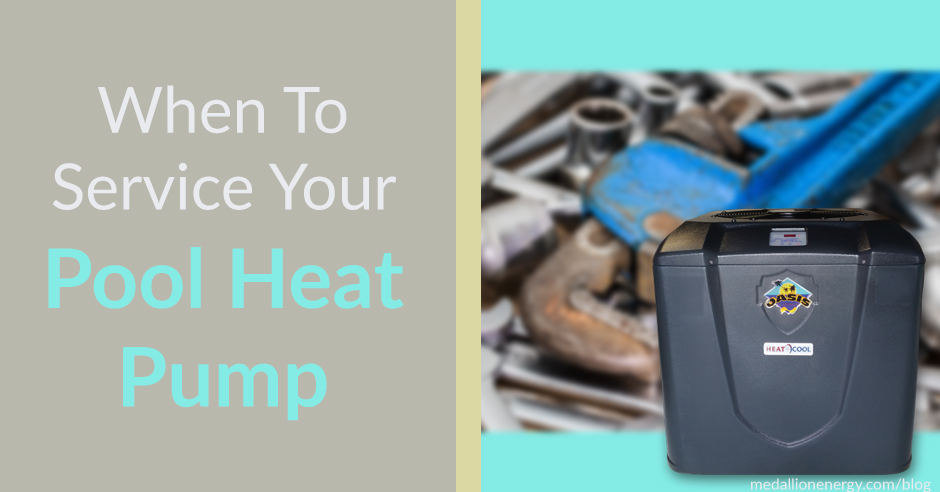Trying to figure out when to service your pool heat pump?
Find out in this post.
If you use a pool heat pump to warm up your pool, then you already that owning one completely transforms pool ownership. Without a pool heater, your swims are limited to sunny days and warmer temperatures. But with a pool heat pump, you swim comfortably whether it’s 100 degrees out or 60.
And while a pool heat pump’s lifespan is one of the longest at 10-20 years, service and maintenance make all the difference.
Fact is, these energy efficient pool heaters easily last much longer than their expected lifespans. Often twice as long, that is, assuming you service your pool heat pump regularly.
Which leads to an important question: when should you service your pool heat pump?
If you guessed at least once a year, you’re on the right track. But there’s actually more to it.
There are certain weather events and conditions when servicing your pool heat pump is a wise choice that can save you money, and prevent unexpected disaster. In this post, we explain everything you need to know to keep your pool heat pump in tip-top shape from season to season.
When To Service Your Pool Heat Pump
Why service a pool heat pump?
We’ll use our favorite analogy to answer this question: imagine your pool heat pump as a car
Just like a car, your pool heat pump gets plenty of use throughout the year. It’s a complex machine with lots of moving parts, components, and electronics tucked inside.
So just like when you first get your car, everything is smooth and problem free. All the parts work as expected, there’s no strange behavior, and it performs as you expect.
That’s on day 1.
Fast forward a few years and things might be different depending on one factor: whether or not you serviced your car during those 5 years
Just like cars need regular oil changes and tune-ups, there’s plenty of light maintenance that pool heat pumps need in order maintain peak performance.
If you’re the hypothetical driver who kept up with maintenance and remembered to service the car regularly, then chances are it’s handling just as responsively as the day you drove it off of the lot.
On the other hand, if you neglected maintenance and didn’t bring in the car for service then your story is a bit different This type of neglect puts a strain on other parts and causes the machine to work much harder than it’s supposed to, which in turn shortens its lifespan.
Your pool heat pump is exactly like a car. There are sensors, wires, connectors, switches, valves, coils, and so much more that need to be checked, cleaned, and tested each swim season.
And while you can always choose to not service your pool heat pump, one thing is a certain: one service call costs way less than replacing an entire pool heater
When to service your pool heat pump
So now that you understand the importance of pool heat pump maintenance, we can get to the core of this post. And that’s knowing when to service your pool heat pump.
The answer: at least once every year
Annually servicing your pool heat pump helps you avoid expensive repairs and big energy bills. And it keeps your pool heater working much longer, at peak performance with the best energy efficiency.
That said, there are also a few situations when you should make pool heat pump service your first priority.
After a hurricane or tropical storm



Hurricanes cause a whole bunch of headaches for unprepared pool owners, from scattered debris and broken screening to damaged equipment and electrical problems. Hence why it’s best to properly prepare your pool for a hurricane well in advanced.
But even with the best preparation, a hurricane can still cause stress and damage to your pool heat pump in ways that you may not notice.
If a power surge occurs, your pool heat pump’s compressor can take the hit. And a compressor is an essential part of a pool heat pump, so naturally, it’s a costly replacement.
But that’s worse case scenario.
It’s much more likely that a post-hurricane pool heat pump may suffer from a faulty sensor or dirty evaporator coil. Specifically, the evaporator coil, since it’s the most exposed part of heat pump aside from the fan.
When a sensor is dirty, it puts a strain on the unit and creates a rippling effect that causes other parts to begin malfunctioning one by one.
Meanwhile, a dirtied evaporator coil will struggle to properly do its job, affecting the entire heating process and straining itself into an untimely demise.
So if you experience a major storm or hurricane, don’t forget to check on your pool heat pump before you put it back to work.
When you hear strange noises coming from the pool heater
This one is kind of a given.
The second your pool heater starts making a noise that you don’t recognize, call a pool heating specialist.
In many cases, it might not seem like a big deal to keep running the machine. But in reality, forcing a pool heat pump to run when one important part isn’t working correctly can wear down the unit, and even cause it to break down completely.
Maybe you notice a screeching, which could be related to the fan. Or maybe the pump is operating much louder than it used to.
Either way, if you hear a sound, don’t ignore it. Doing so might cost you later.
After a snowstorm or blizzard



Although this only applies to a fraction of pool owners, it’s still worth mentioning.
If at any point you expect to deal with freezing temperatures or snowstorms, winterizing your pool and pool heater is a must.
It’s a relatively short process that not only saves you time and money but also makes opening your pool much easier, so don’t neglect it.
That said, it’s still wise to service your pool heat pump after a storm for a few reasons:
- You can’t always see freeze damage, but you don’t want to find out you have it the hard way
- An internal sensor or switch may be permanently malfunctioning due to frost or corrosion damage
- Your unit may have gotten too cold, causing housing and other internal fixtures to crack or break
After a brownout/blackout
As we mentioned earlier, there’s always the risk of electrical damage during a major storm or power surge.
And sometimes, an affected pool heat pump will show no immediate signs of damage. Which naturally leads to pool owners continuing to run a pool heater that they’re unaware is damaged.
If it’s a sensor that’s going bad, you might get lucky and see an error code.
But if your compressor malfunctions, then the whole pool heat pump can be in jeopardy. Of course, that’s why Compressor Defenders exist – they shield your pool heat pump from would be electrical damage by absorbing the charge.
When the pool heater isn’t turning on



If your pool heater isn’t turning on, get it serviced.
Yes, you could always try your hand at fixing it. But unless you have all the tools for the job and the professional assistance needed for your DIY pool heater repair, the odds are against you.
Even if you find what looks to be the root of the problem, the true cause can be lurking in the background and creep up on you a few days later.
That said, a pool heater that doesn’t turn on doesn’t always mean that costly repairs are in order. Sometimes the problem is as simple as a lack of water flow or proper power.
But often times, it’s not.
And if you force a pool heat pump to run that hardly wants to turn on in the first place, chances are you’re headed straight toward damaging it further.
Plus, since the cost of servicing your pool heat pump is substantially lower than the cost to replace it, you’re better off getting it looked at than risking irreversible damage.
Closing thoughts
If you want to keep your pool heat pump in the best shape possible and avoid those expensive and unexpected repairs, regular service and maintenance are key. Servicing your pool heat pump is what helps catch the little issues before they turn into major problems, and ensures that everything works as it should.
You wouldn’t neglect to service your car, right? The wonderful machine that effortlessly transports you from destination to destination in minutes.
So why not give your pool heat pump that same love? The dependable and convenient piece of pool equipment that allows you to swim comfortably throughout the swim season.
Want to keep your pool heat pump in tip-top shape and avoid costly repairs?
Schedule a pool heat pump service call in less than 2 minutes
If you enjoyed this post, you might also like:


